 It’s my great pleasure to welcome back crime writer J J Marsh. We met a while ago in a distanced way on Facebook – the two of us belong to the Alliance of Independent Authors – but when she and I were both selected as indie Editor’s Choices in prestigious UK publishing trade magazine ‘The Bookseller’ I invited her to talk to us about her book, Cold Pressed, its world and heroine. It’s my great pleasure to welcome back crime writer J J Marsh. We met a while ago in a distanced way on Facebook – the two of us belong to the Alliance of Independent Authors – but when she and I were both selected as indie Editor’s Choices in prestigious UK publishing trade magazine ‘The Bookseller’ I invited her to talk to us about her book, Cold Pressed, its world and heroine.
Writer, journalist, teacher, actor, director and cultural trainer, Jill has lived and worked all over Europe. Now based in Switzerland, she’s a founder member of Triskele Books, writes for Words with JAM magazine, co-edits Swiss literary hub The Woolf and reviews for Bookmuse.
Welcome Jill!
Why did you write Behind Closed Doors?
After getting heartily sick of crime novels where the only roles for women were mutilated prostitute or ‘feisty kickboxing nubile ladycop’. I wanted to read about women who were good and bad, flawed, complex, morally questionable, physically ordinary and real. So I created Beatrice Stubbs. (And as a reader, I can tell you she’s a wonderful heroine, full of flaws, insight, ordinariness and cleverness at the same time.)
Why do you think Beatrice is like she is?
Beatrice has developed coping strategies after years of struggling with depression and mood swings. After all, she’s from a generation in which mental health is a matter of ‘pulling yourself together’. Her appetites are lusty, her temper unpredictable and her loyalties unswerving. People’s assumptions about her generally work in her favour, so she plays up to them. And still, after all this time, she feels guilty.
What does she think she’s like?
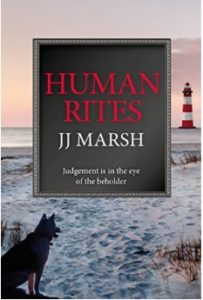 Extract from Human Rites: “Beatrice had always prided herself on a clear-eyed self assessment – she knew she was nothing special. Hard work and application enabled her to rise through the ranks of the Met, because her intelligence was no more than the upper end of average. Talent, kindness and wit, albeit mediocre, were in evidence, as were selfishness and greed. Her looks would never turn heads, apart from her hair, and that caused more alarm than admiration. She lacked vanity, despite a sizeable ego, but on the whole, she’d always quite liked herself. Until her diagnosis.” Extract from Human Rites: “Beatrice had always prided herself on a clear-eyed self assessment – she knew she was nothing special. Hard work and application enabled her to rise through the ranks of the Met, because her intelligence was no more than the upper end of average. Talent, kindness and wit, albeit mediocre, were in evidence, as were selfishness and greed. Her looks would never turn heads, apart from her hair, and that caused more alarm than admiration. She lacked vanity, despite a sizeable ego, but on the whole, she’d always quite liked herself. Until her diagnosis.”
Oh, that’s a teaser line to end on!
What’s Behind Closed Doors about?
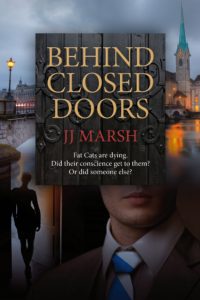 “Fat Cats are dying. Did their conscience get to them? Or did someone else?” “Fat Cats are dying. Did their conscience get to them? Or did someone else?”
Suicide – the act of taking one’s own life.
Homicide – the act of taking someone else’s.
An unethical banker suffocates. A diamond dealer slits his wrists. A media magnate freezes in the snow. A disgraced CEO inhales exhaust fumes. Four unpopular businessmen, four apparent suicides. Until Interpol find the same DNA at each death.
Beatrice Stubbs, on her first real case since ‘the incident’, arrives in Switzerland to lead the investigation. But there’s more to Zurich than chocolate and charm.
Potential suspects are everywhere, her Swiss counterpart is hostile and the secretive world of international finance seems beyond the law. Battling impossible odds by day and her own demons at night, Beatrice has never felt so alone.
She isn’t.
Someone else believes in justice.
The poetic kind.
“Thrilling new crime fiction from a seriously good writer” – Annemarie Neary, author of Siren
Buy on Amazon Buy on iBooks/iTunes
Connect with JJ Marsh Website Twitter: @jjmarsh1
Alison Morton is the author of Roma Nova thrillers, INCEPTIO, PERFIDITAS, SUCCESSIO and AURELIA. The fifth in the series, INSURRECTIO, was published in April 2016.
Find out more about Roma Nova, its origins, stories and heroines… Get INCEPTIO, the series starter, for FREE when you sign up to Alison’s free monthly email newsletter
If you enjoyed this post, do share it with your friends!Like this:Like Loading...
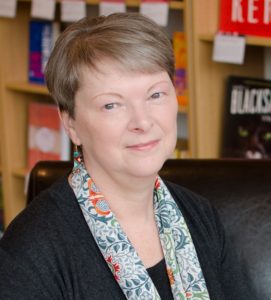 Lucienne Boyce has published two historical novels, To The Fair Land (2012) and Bloodie Bones: A Dan Foster Mystery (2015). She published The Bristol Suffragettes (non-fiction) in 2013. She is currently working on the second Dan Foster Mystery and the biography of a suffragette with Bristol connections. She is a steering committee member of the West of England and South Wales Women’s History Network, and recently joined Bristol’s BCfm Radio as a presenter on the Silver Sound programme. Lucienne Boyce has published two historical novels, To The Fair Land (2012) and Bloodie Bones: A Dan Foster Mystery (2015). She published The Bristol Suffragettes (non-fiction) in 2013. She is currently working on the second Dan Foster Mystery and the biography of a suffragette with Bristol connections. She is a steering committee member of the West of England and South Wales Women’s History Network, and recently joined Bristol’s BCfm Radio as a presenter on the Silver Sound programme.
Why did you write Bloodie Bones: A Dan Foster Mystery?
I write historical fiction about the eighteenth century and non-fiction about the women’s suffrage campaign. Both are aspects of my interest in radical history and the history of protest. I’m interested in telling stories of how people made powerless by the law are finally driven to resist that law – to become stone-throwers, vandals, arsonists – and in thinking about how far they could and should go in those struggles.
At the same time, I’d been pleasantly surprised by how much I enjoyed writing the mystery elements of my first novel, To The Fair Land (also set in the eighteenth century – about the search for the anonymous author of a book about a voyage to the South Seas which involves the hero getting to the bottom of old and new crimes). More to the point, readers were telling me they enjoyed those aspects of the story. I’ve always loved detective fiction – I’m a huge fan of Lord Peter Wimsey, Sherlock Holmes and Inspector McLevy. I also have a long-standing interest in the eighteenth century, a period when I think many of the systems we live with today were established or developed, including the policing system. The Bow Street Runners were the forerunners of our modern CID, and even without the assistance of modern forensic processes many of their investigative methods are remarkably familiar.
So it seemed natural to combine all this and come up with a Bow Street Runner as my main character. In that way, I could write about someone whose job is to uphold the law at a time of great social change and unrest. One of the most far-reaching of those changes was land enclosure, when land previously accessible to the poor was taken into private ownership. For many poor people it was an economic disaster, driving them out of their homes and into the cities, where they provided the cheap labour that made the expansion of industry possible.
 Decaying hedges mark the lines of the straight field boundaries created by the 1768 Parliamentary Act of Enclosure of Boldron Moor, County Durham. Creative Commons Attribution-Share Alike 2.0 Generic licence. Attribution: Andy Waddington A major inspiration for Bloodie Bones was John Clare’s poem The Mores, which reminds us that these changes had an emotional impact as well as an economic one. All too often, the history of enclosures (like that of its urban counterpart, industrialisation) has been told as part of a narrative of “progress”. Clare’s poem draws our attention to the fact that it affected real people: “Inclosure came and trampled on the grave/Of labour’s rights and left the poor a slave.”[1]
Why do you think your main character, Dan Foster, is like he is?
Dan Foster had a tough upbringing. Abandoned and homeless as a child, he survived on the streets by thieving. That means he understands what it is to be hungry and homeless, to be ragged and cold, to be treated as a scrounger and a beggar. He also knows that law and justice are not necessarily synonymous. Yet he often struggles with his sense of injustice and his duty to uphold the law. In Bloodie Bones, for example, he begins to realise what’s at stake for the protestors. It’s a tension that can only intensify – perhaps one day he will have to decide on which side he stands.
He also has a deep-rooted fear of being cast back into the poverty, violence and squalor of his past. That makes him ambitious to succeed in his profession. As the series develops we’ll see him trying to balance this with his growing distaste for an oppressive legal system. He’ll struggle with personal issues too, and in particular his unhappy marriage and his love for his wife’s sister.
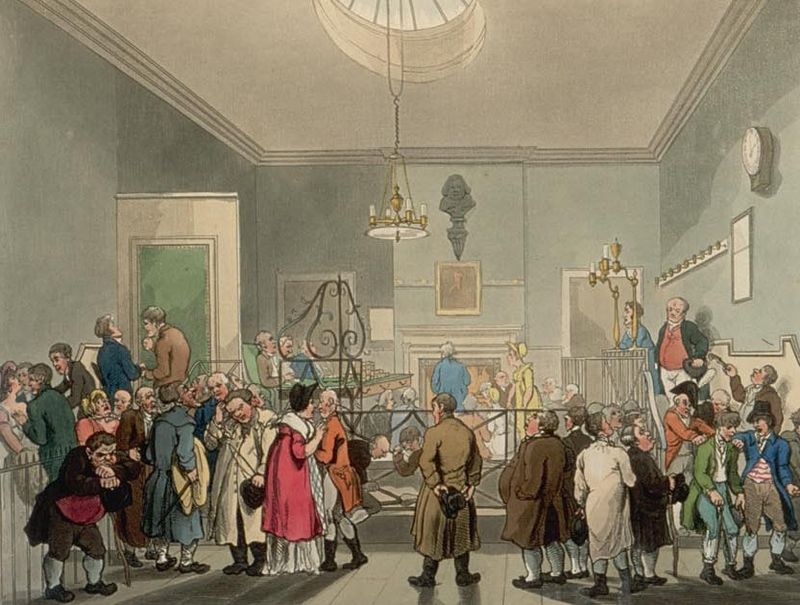 Bow Street Magistrates’ Court in London: This engraving was published as Plate 11 of Microcosm of London (1808) What does Dan Foster think he is like?
“I’m a Principal Officer attached to Bow Street Magistrates’ Court – what you might know as a Bow Street Runner – though we’re known by many other names too, which I won’t mention in polite company. I’d never have got this far if it hadn’t been for the man I call Dad, Noah Foster. Noah came across me at the Oliver v Johnson fight back in ’81. I was out on the prigging lay* and I’d got into a fight of my own with another diver* who thought I was poaching on his patch. Gave me a beating too, but Noah saw something in the savage, sullen thing I was then and he took me home to his gym, brought me up, trained me to fight scientifically.
I know there are those who think that boxing is low and vicious and it’s true there are plenty who call themselves pugilists who are nought but butchers. But what Noah taught me was something different. It was discipline and courage. It was self-respect. It was to hate a bully, to stand up to the strong who prey on the weak. It was the saving of me – and still is, for in my line of work soft words are not always enough to turn what you might call the hand of wrath. I’m not so keen on pistols, only as a last resort. So the science comes in handy.
I’ve never wanted to turn professional – I’ve seen too many good fighters ruined by fame and fortune. Dad’s always accepted that – in fact, it was him who suggested I join the Bow Street patrol as a way of earning some money, though I’ll inherit the gym one day. A day I hope is a long way off yet. But Mrs Foster – Caroline – doesn’t see it that way. She’d rather be married to a boxing champion than a Bow Street Runner. But if my fighting skills are to mean anything it’s here, in the job. This is who I am. I’m Dan Foster, Principal Officer of Bow Street.”
*prigging lay – thieving
* diver – pickpocket
[1] John Clare, The Mores, in Selected Poems and Prose of John Clare, edited by Eric Robinson and Geoffrey Summerfield (Oxford: Oxford University Press, 1967), pp. 169 – 171.
So what’s Bloodie Bones: A Dan Foster Mystery about?
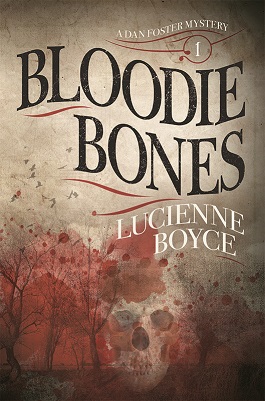 “Parsons and tyrants friends take note. We have born your oppreshuns long enough. We will have our parish rights or else Bloodie Bones will drink your blood.” “Parsons and tyrants friends take note. We have born your oppreshuns long enough. We will have our parish rights or else Bloodie Bones will drink your blood.”
When Lord Oldfield encloses Barcombe Wood, depriving the people of their ancient rights to gather food and fuel, the villagers retaliate with vandalism, arson and riot. Then Lord Oldfield’s gamekeeper, Josh Castle, is murdered during a poaching raid. Dan Foster, Bow Street Runner and amateur pugilist, is sent to investigate.
Dan’s job is to infiltrate the poaching gang and bring the killers to justice. But there’s more to Castle’s death than at first sight appears. What is the secret of the gamekeeper’s past and does it have any connection with his murder? What is Lord Oldfield concealing? And did someone beside the poachers have a reason to want Josh Castle dead?
As tensions in Barcombe build to a thrilling climax, Dan will need all his wits and his fighting skills to stay alive and get to the truth.
Bloodie Bones is a winner of the Historical Novel Society Indie Award 2016 and was a semi finalist for the M M Bennetts Award for Historical Fiction 2016.
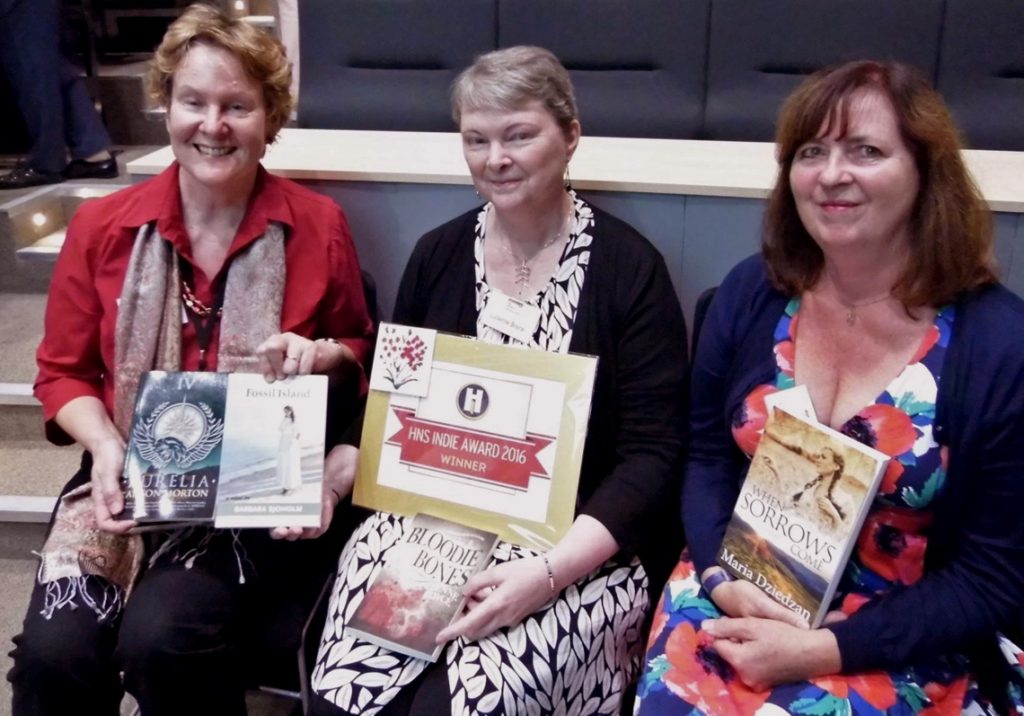 Alison, Lucienne and Maria, three of the 2016 finalists, Historical Novel Society Indie Award  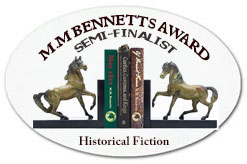
Buying links: Amazon.co.uk Amazon.com
Also available on Kobo, Nook and iBooks.
Connect with Lucienne: Website Twitter @LucienneWrite
Facebook Blog Goodreads
Alison Morton is the author of Roma Nova thrillers, INCEPTIO, PERFIDITAS, SUCCESSIO and AURELIA. The fifth in the series, INSURRECTIO, was published in April 2016.
Find out more about Roma Nova, its origins, stories and heroines… Get INCEPTIO, the series starter, for FREE when you sign up to Alison’s free monthly email newsletter
If you enjoyed this post, do share it with your friends!Like this:Like Loading...
Readers need books. Writers want to write. Seems like a match made in heaven, doesn’t it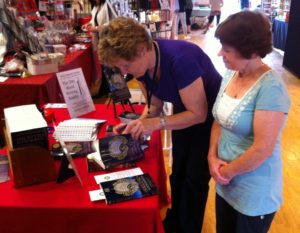 ? ?
Writing is a solitary occupation. But publishing a book can’t be done without others: beta readers, critique partners, editors (structural, developmental, line, copy) and proofreaders. Take your pick.
Then we need a marketing team: advance readers, blog hosts, friends/colleagues who will tweet and post on social media, reviewers, connectors. All these are needed to show readers that a book exists.If your book is a gripping read, well formatted with a stunning cover and blurb and available on several platforms and in different formats (ebook of various types, paperback, perhaps audio), they you have a good start.
 As Cicero said, everybody is writing a book these days. Many are not good, but how to make the diamonds stand out amongst the pile of poo? Once discovered by appreciative readers, much of the work is done. If your books’s any good, they will tell their friends, leave a review and hopefully rave about them generally. And if you write another, then readers will start to give you their love. Be respectful of that – they are spending life hours reading your stuff. Make sure it’s worth it. 🙂 As Cicero said, everybody is writing a book these days. Many are not good, but how to make the diamonds stand out amongst the pile of poo? Once discovered by appreciative readers, much of the work is done. If your books’s any good, they will tell their friends, leave a review and hopefully rave about them generally. And if you write another, then readers will start to give you their love. Be respectful of that – they are spending life hours reading your stuff. Make sure it’s worth it. 🙂
I digress. There’s an old motto in French “L’union fait la force” (Strength through unity). You’re not going to be surprised that it has a Latin source – yep, it’s those pesky Romans again. Gaius Sallustius Crispus, or Sallust as we generally call him, was a Roman historian and politician (86 – c. 35 BC). Although probably more famous for his account of the Cataline conspiracy, he wrote a tome about the Jugurthine War and in Chapter 10 said “concordia res parvae crescunt” (small things flourish by concord). Everybody loves to jump on a saying from the Roman Empire for their national and state motto and several countries have done so.
 ALLI authors meet up at the London Book Fair April 2014 For authors, this rule applies. Working together, we can achieve a great deal more than by ourselves. This is why we join writing associations and groups, not just because we are lonely. If you read my Roma Nova blog, Facebook page and follow me on Twitter, you know I talk about my books, hopefully not in a spammy way. But it’s from joint promotion that I gain most. And bringing my books to readers is what counts, not just for the money, but to get my stories to them, entertain them and possibly provoke them. 😉
Alison Morton is the author of Roma Nova thrillers, INCEPTIO, PERFIDITAS, SUCCESSIO and AURELIA. The fifth in the series, INSURRECTIO, was published in April 2016.
Find out more about Roma Nova, its origins, stories and heroines… Get INCEPTIO, the series starter, for FREE when you sign up to Alison’s free monthly email newsletter
If you enjoyed this post, do share it with your friends!Like this:Like Loading...
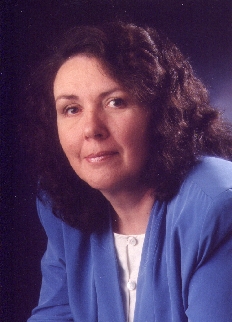 This week’s guest, multi-published Joanna Maitland, knows all about loving her characters, but to ring the changes from the ‘Love me, love my character’ series, I’ve asked her to give as some of her valuable expertise. What am I talking about? Read on… This week’s guest, multi-published Joanna Maitland, knows all about loving her characters, but to ring the changes from the ‘Love me, love my character’ series, I’ve asked her to give as some of her valuable expertise. What am I talking about? Read on…
Joanna Maitland’s first historical romance went through the Romantic Novelists’ Association’s New Writers’ Scheme (NWS) and was then published by Harlequin Mills & Boon. Twelve more Mills & Boon historicals followed. At the same time, Joanna became a reader for the NWS and got a real kick out of helping other aspiring writers along the difficult road to publication. Some of her NWS ‘clients’ have gone on to great success.
Joanna now publishes her books independently and provides freelance editing services to fellow writers, published or unpublished. She is a Vice-President of the Romantic Novelists’ Association (RNA) and a partner in Libertà Books, which runs the libertabooks.com website and offers writing courses and workshops for all levels of experience.
Her most recent Kindle ebook – His Silken Seduction, a Regency novella – is available from Amazon.
Welcome Joanna! Tell us a little about your writing journey

I spent nine years being rejected by Mills & Boon. Encouraging rejections – keep trying, they said – but still no.
I visualised editors as gatekeepers, dividing manuscripts into reject and accept piles. I thought editors checked spelling and commas in manuscripts they’d accepted. How ignorant I was! Copy editors do that, plus facts, continuity, and much more.
 When M&B finally accepted me – partly thanks to the RNA’s New Writers’ Scheme – I discovered what editors do. When M&B finally accepted me – partly thanks to the RNA’s New Writers’ Scheme – I discovered what editors do.
As my partner at Libertà Books, Sophie Weston, puts it, “the editor is the author’s first, best reader”.
So is what’s the difference between editing for traditionally published and self-published?
If you’re published by a traditional house, professional editing comes with the deal.
A self-published author pays her own freelance editor. Or does without.
I’m self-published now. I also freelance edit for other authors, like Alison Morton, my host here. (And very pleased I am with it – Joanna has done the structural editing for several of the Roma Nova books. My goodness, she has a sharp eye, and plenty of bracing, but 24 carat gold advice!)
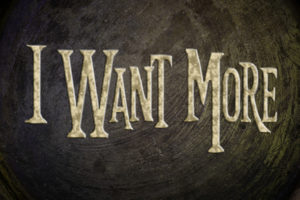
So, do I act as editor for my own manuscripts?
No.
I pay a trusted freelance editor as my “first, best reader”, because I can’t be objective enough to edit my own MS. Because that’s not how editing works.
So how does editing work?
Let’s assume my client, Arabella Author, sends me her completed manuscript. It’s as good as she can make it. I don’t ask for a synopsis. I want to approach the story from cold, like a paying reader, going on a journey into the unknown with Arabella’s characters.

Sometimes, I’m so carried away by Arabella’s story that I marvel. And I tell her so. Sometimes, a scene has less impact than it might have. Or maybe something jars me out of the story altogether – haven’t we all yelled at the TV when loose ends are left hanging?
Then, I may make comments like:
• I wasn’t convinced by this, because… [plot point that didn’t work for me, or motivations I found unclear, or loose ends not tied up, etc]
• As a reader, I was longing for more here about this character’s feelings / this relationship / this plot set-up / this location …
• I was confused here because…
• You lost me here, as a reader, when…
• As a reader, I felt that the story missed telling me about…

Arabella is too close to her MS to see these issues. Authors usually are. We know the background, characters, motivations – everything about everything, past and future. We can’t put ourselves in the position of a new reader, starting from zero.
That’s what the professional editor does. That’s why I don’t edit my own books.
What are the key editing principles?
As Arabella’s editor, I must avoid telling her what to write. It’s her book, not mine. As an engaged reader, I’ve identified an issue. Provided Arabella trusts me, I may tentatively suggest an outline approach (preferably with alternatives, so she doesn’t feel pushed in one particular direction).

My editor’s role is to fire Arabella’s imagination so she fixes the issue herself – provided she agrees it needs fixing, of course! – either by building on my prompts or by finding a whole new slant of her own. Often, Arabella finds a much better solution than anything I might have hinted at. And I cheer.
Oh, and I may also correct punctuation. My inner copy editor is a pest!
(Hahaha! No, really)
Thank you so much for stopping by, Joanna, and my warmest wishes for your editing services business. Your clients will be getting one of the best!
Connect with Joanna Website Blog Amazon author pages
Twitter @joannamaitland @libertabooks Facebook
 Libertà Books
What’s Joanna’s latest book about?

Wounded. Abandoned. In the enemy’s bed.
He’s Wellington’s spy, trying to survive in war-torn France.
He has a choice – duty, or desire.
She’s his beautiful silk weaver. Day after day, her hands caress his battered flesh. Her touch is driving him wild.
But she’s the enemy. She must not discover who he is.
Surely she will betray him?
Will he dare to trust her with his life, his mission, and his heart?
Kindle ebook available from Amazon
Alison Morton is the author of Roma Nova thrillers, INCEPTIO, PERFIDITAS, SUCCESSIO and AURELIA. The fifth in the series, INSURRECTIO, was published in April 2016.
Find out more about Roma Nova, its origins, stories and heroines… Get INCEPTIO, the series starter, for FREE when you sign up to Alison’s free monthly email newsletter
If you enjoyed this post, do share it with your friends!Like this:Like Loading...
 Today I’m delighted to welcome David Penny, historical fiction writer and fellow member of the Alliance of Independent Authors. David published four novels in the 1970s before being seduced by a steady salary. He has now returned to his true love of writing with the first three books in a series of historical mysteries set in Moorish Spain at the end of the 15th century. He is currently working on The Incubus, the fourth in the Thomas Berrington series. Today I’m delighted to welcome David Penny, historical fiction writer and fellow member of the Alliance of Independent Authors. David published four novels in the 1970s before being seduced by a steady salary. He has now returned to his true love of writing with the first three books in a series of historical mysteries set in Moorish Spain at the end of the 15th century. He is currently working on The Incubus, the fourth in the Thomas Berrington series.
Welcome, David! This is your first ‘proper’ visit although you were caught drinking wine with me earlier this year at the Harrogate crime writing festival!
Now tell us about why you wrote The Red Hill…
The Red Hill is the first in a planned 10 book series – the fourth is due to appear early 2017. It was always planned that way, right from the very start, which was one of those Eureka! moments.
The entire concept of a series of books set in the final years of the Moorish Caliphate in Andalusia came in less than a second, and I knew exactly how I wanted it to end (but no spoilers!). Because of that I had to work out where to start, which turned out to be ten years before 1492. Thus, The Red Hill was born.
Why do you think your main character is like he is?
The protagonist of all books is Thomas Berrington, an English emigré who finds himself in Spain where he trains to be a surgeon. He is insular, intelligent, but perhaps believes too much in his own abilities. Also, due to being orphaned at 13 after the Battle of Casillon in France he has had to learn how to survive – skills that come in useful during his adventures.
Thomas has cut himself off from emotional attachment, but that begins to change during the first book of the series, and changes even more during the remainder.
What does he think he is like?
Thomas sees himself as a loner who believes he is content with his loneliness, but continually forms attachments to others. His closest friend is the palace eunuch, Jorge, whom Thomas operated on to make him what he is, making for a sometimes complex relationship.
Thomas is aware of a dichotomy within himself. The cool-headed surgeon who operates with great skill but little compassion, and the violent man who is aware of his violence and tries to suppress it, not always successfully.
Complex indeed! Thank you, David, for intriguing us with Thomas.
So what’s The Red Hill about?
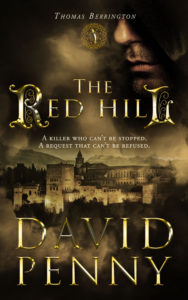
A killer who can’t be stopped.
A request that can’t be refused.
In 1482, Englishman Thomas Berrington is living in the last remnant of Moorish Spain. A physician, he is an unwilling friend to the most powerful man in the kingdom. Bodies are discovered, each showing the marks of a savage attack and Thomas is asked to investigate.
When one of the Sultan’s wives is brutally murdered, what begins as a reluctant task turns into a fight for survival. Together with the eunuch, Jorge, Thomas attempts to hunt down the killer before they become his next victims. Except nothing is as it seems—friends turn into enemies and enemies into friends.
Thomas’s investigation lays bare the secrets of the Red Hill and the people who inhabit it. His discoveries culminate in a battle not only for his own life, but for the lives of those he loves.
Buying links: Amazon UK Amazon US
Connect with David: Website Facebook Twitter @davidpenny_
Alison Morton is the author of Roma Nova thrillers, INCEPTIO, PERFIDITAS, SUCCESSIO and AURELIA. The fifth in the series, INSURRECTIO, was published in April 2016.
Find out more about Roma Nova, its origins, stories and heroines… Get INCEPTIO, the series starter, for FREE when you sign up to Alison’s free monthly email newsletter
If you enjoyed this post, do share it with your friends!Like this:Like Loading...
|
Subscribe to Blog via Email
Join 50 other subscribers.
Categories
Archive
|
 It’s my great pleasure to welcome back crime writer J J Marsh. We met a while ago in a distanced way on Facebook – the two of us belong to the Alliance of Independent Authors – but when she and I were both selected as indie Editor’s Choices in prestigious UK publishing trade magazine ‘The Bookseller’ I invited her to talk to us about her book, Cold Pressed, its world and heroine.
It’s my great pleasure to welcome back crime writer J J Marsh. We met a while ago in a distanced way on Facebook – the two of us belong to the Alliance of Independent Authors – but when she and I were both selected as indie Editor’s Choices in prestigious UK publishing trade magazine ‘The Bookseller’ I invited her to talk to us about her book, Cold Pressed, its world and heroine.  Extract from Human Rites: “Beatrice had always prided herself on a clear-eyed self assessment – she knew she was nothing special. Hard work and application enabled her to rise through the ranks of the Met, because her intelligence was no more than the upper end of average. Talent, kindness and wit, albeit mediocre, were in evidence, as were selfishness and greed. Her looks would never turn heads, apart from her hair, and that caused more alarm than admiration. She lacked vanity, despite a sizeable ego, but on the whole, she’d always quite liked herself. Until her diagnosis.”
Extract from Human Rites: “Beatrice had always prided herself on a clear-eyed self assessment – she knew she was nothing special. Hard work and application enabled her to rise through the ranks of the Met, because her intelligence was no more than the upper end of average. Talent, kindness and wit, albeit mediocre, were in evidence, as were selfishness and greed. Her looks would never turn heads, apart from her hair, and that caused more alarm than admiration. She lacked vanity, despite a sizeable ego, but on the whole, she’d always quite liked herself. Until her diagnosis.” “Fat Cats are dying. Did their conscience get to them? Or did someone else?”
“Fat Cats are dying. Did their conscience get to them? Or did someone else?”






























